9 Best SendOwl Alternatives For 2024 (Comparison)

Are you looking for a SendOwl alternative that makes it easy to sell your digital products?
We’ve got you covered.
SendOwl is a fantastic tool but it isn’t ideal for everyone’s needs. It’s a good idea to check out some alternatives to see if another ecommerce platform might be a better fit for your needs.
In this post, we’re comparing the best SendOwl alternatives that can help you start selling digital products right away. We’ll explore all of their features, pricing, and everything else you need to know.
Summary: The best SendOwl alternatives
TL;DR:
- Sellfy — Best alternative to SendOwl overall. Simple platform with impressive features. Sell digital products, physical products, subscriptions, print on demand merch and more.
- Podia — Best alternative to SendOwl for content creators who need an “all-in-one” approach to selling online. Sell courses, webinars, and more. Includes affiliate marketing, email marketing, and customer communication functionality.
- Payhip — Choose Payhip if having a fast checkout process is your priority.
- Lemon Squeezy — Powerful cart solution that is great for selling software licenses and other products.
- DPD — Solid SendOwl alternative with a good range of third-party integrations.
- Shopify — Best for creating full ecommerce stores.
- Gumroad — Simple SendOwl alternative but lacking in support.
- Squarespace Ecommerce — Best website builder with built-in ecommerce functionality.
- BigCommerce —Another great platform for creating full ecommerce stores.
1. Sellfy
Sellfy is the best SendOwl alternative if all you need is a simple way to sell digital products online. It’s perfect for beginners who want to set up an online store as quickly as possible.
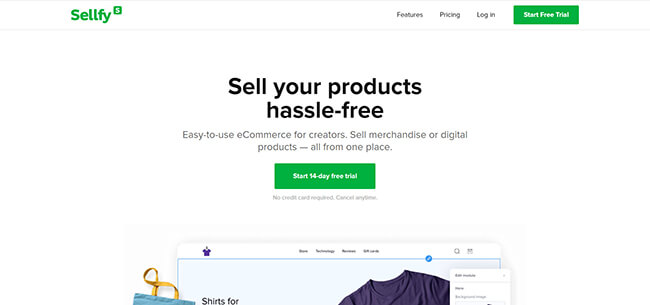
Sellfy lets anyone create a store in just minutes regardless of if you have experience using code or not. All store pages are customizable. That means you can change on-page elements like the logo, background color, and layout. And you can connect your own domain for branding purposes.
There is a Shopping Cart feature that lets your customers buy multiple items in one go. And you can enable the Store Language feature to translate pages to your customer’s native language.
You can sell digital products on Sellfy. However, it also comes with a print-on-demand capability that allows you to sell shirts, mugs, stickers, and other products with your design on them. Sellfy will handle the printing and shipping of physical products on your behalf. You can sell your own physical products through your storefront.
But you’re not limited to selling digital products. You can also offer weekly, monthly, or yearly subscriptions. And you can also offer videos on demand. Sellfy has security measures in place that’ll prevent your customers from abusing downloads.
Sellfy also has digital marketing features that are designed to help your business grow. You can promote your products through discount codes, email marketing, and upselling. And you can embed your store to your website and social media accounts through CTA buttons. You can even insert them on YouTube end screens and cards.
You can accept credit card payments using Stripe integration or have customers pay through PayPal. Sellfy is PCI-DSS-ready — that means all payment information is handled by trusted payment processors.
Perhaps one of the best things about Sellfy is that it’s not that expensive. Paid plans start from as little as $19/month.
Pricing: Starter (starts at $19/month billed bi-annually), Business (starts at $49/month billed bi-annually), Premium (starts at $99/month billed bi-annually).
Sellfy offers a 30-day money back guarantee.
Read our Sellfy review.
2. Podia
Not only is Podia great for selling digital products, but it’s also ideal for selling webinars and online courses as well.

Let’s start by discussing some of its marketing features. As you might expect, Podia has all the tools you’ll need to build a mobile-responsive store from scratch. And you can create so many types of web pages. You can create an entire website if that’s what you need. You can also publish sales pages and signup pages.
There’s no coding required to customize pages. Plus, you can preview the pages as you work on them.
One of the biggest advantages that Podia has over some of its competitors is its affiliate marketing tool. It empowers your partners and customers to start selling your products on your behalf. It’s easy to set up and customize. You set your own terms including the commission amount. And you can set your program to be invite-only or open to everyone. Podia will even help with payouts, telling you how much you owe people.
The Email Marketing feature lets you capture email leads through signup forms and send email broadcasts to the entire list. You can also create email drip campaigns to help potential customers work their way through your sales funnel.
As mentioned earlier, you can sell all sorts of digital products. The list includes ebooks, templates, presets, music, and audio files. You can also do bundles to significantly increase your chances of earning larger profits.
Selling online courses and webinars is also possible with the platform.
Podia doesn’t have transaction fees though you will have to pay for the processing fees charged by Stripe and PayPal. As with all other platforms.
Plans are a bit more expensive than some of the others featured on this list. However, they do offer unlimited everything — products, customers, messages, sales, and file hosting. And there is free migration plus 7-days-a-week support. You will have to pay additional fees for every team member you plan on adding though.
Pricing: Mover ($39/month), Shaker ($79/month), Earthquaker ($179/month).
Free plan available with transaction fees.
Read our Podia review.
3. Payhip
Payhip markets itself as an all-in-one solution that emphasizes its fast checkout process. It claims that customers can complete a purchase in just seconds. Having a complex checkout process can spell the difference between closing a sale and losing a customer. So if that’s a concern for you, then maybe Payhip is the platform you’re looking for.
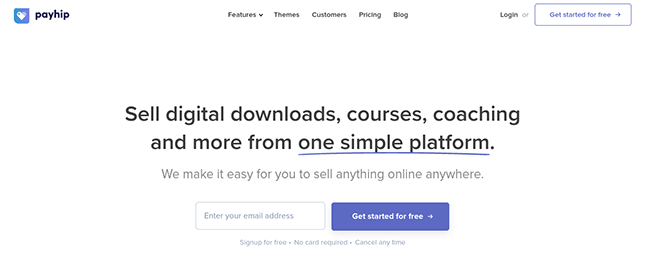
This platform allows you to sell downloads and memberships. Users can buy ebooks, memberships, software, and other digital assets.
Let’s talk about some of the ways Payhip helps with the checkout process. First, the checkout page is responsive — meaning it works on desktops, tablets, or phones. Also, Payhip claims that their checkout pages are highly tuned to increase conversion.
After payments are made, customers will have instant access to their files. As an added measure, the download page for the item they bought will be emailed to them.
It is possible to embed the checkout and shopping cart to your own website for a more seamless user experience.
Users can pay using a credit card — Visa, Mastercard, American Express, Discover, and more. They can also use PayPal if that’s more convenient for them. All payments are secure so your customers can shop with confidence. The best part is that you get paid instantly. Your earnings are directly deposited to your PayPal or Stripe account.
There are built-in marketing tools as well. There’s an affiliate marketing system in place. You can generate coupons, social discounts, and mailing lists. If needed, you can send customers emails about upcoming products or promotions.
If you don’t want customers downloading and resharing your digital products, you can enable security measures like download limits and software licenses. There’s also a PDF stamping feature where the buyer’s purchase details will be displayed on every page of the product PDF. This will discourage users from illegally posting your products on other sites.
Pricing: Free, Plus ($29/month), Pro ($99/month)
Read our Payhip review.
4. Lemon Squeezy
Lemon Squeezy is another notable platform that you can use to sell digital downloads. It allows you to create an online store where you can promote everything that you have to offer including subscriptions and software licenses.
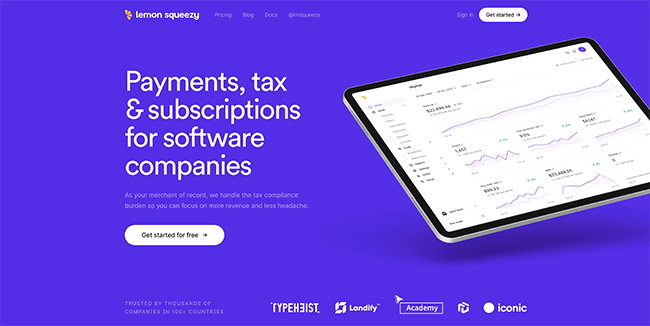
This ecommerce platform promises to keep things easy for the average user. Creating an online store won’t require technical skills. You won’t even need to hire a designer to come up with a professional website. Everything’s customizable so you won’t have a problem matching it to your branding. And all pages are SSL secured and mobile-optimized.
But what’s even more impressive is that you can sell software and apps here too. And this platform provides license keys with each sale. Of course, you can sell other forms of digital products such as ebooks, PDFs, videos, audio files, and photos.
You can also launch a membership program and make sales through subscriptions. Users can sign up for a weekly, monthly, or yearly subscription.
Lemon Squeezy also comes with built-in marketing features. You can connect with your audience through email marketing — either one-off or an entire campaign. There are also options that’ll allow you to create bundles or upsells. You can create lead magnets through freebies or donations. And you can offer discounts using coupon codes.
Use the Business Insights feature to see how well your products are performing. Lemon Squeezy will also handle your invoices and tax compliance concerns. It’s got everything you’ll need to launch your ecommerce store.
Lemon Squeezy has a 14-day-trial period that you can use to assess if this all-in-one platform is right for you. There are two plans available with one more on the way. We should point out that all plans will require you to pay 3.5% plus 30 cents per transaction on top of the monthly or yearly subscription.
There are no limits on products, customers, or file storage regardless of which plan you choose. But the Basic plan won’t allow you to sell subscriptions.
Pricing: No monthly charge, instead there is a transaction fee per sale of 5% +50¢.
5. DPD
DPD stands for Digital Product Delivery — and that’s exactly what the company does best. Here you can sell digital products like ebooks, software, themes, and graphics.
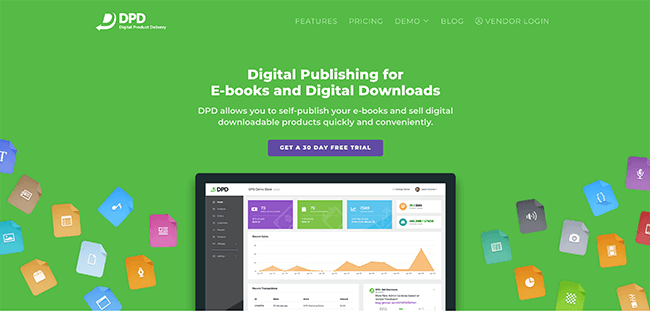
The concept is really simple. All you do is upload your products to DPD then add CTA buttons to your website, blog, or social media. From there, users can buy products directly from you. After purchase, DPD will deliver the files to your customers.
This lets you start selling digital goods from anywhere. DPD works on desktops as well as Android and iOS devices.
There are other features that make DPD a great SendOwl alternative. It’s PCI-DSS compliant. And it uses SSL for all checkouts. DPD does not store cardholder data. Another good thing about it is that it lets you control multiple stores from one account.
DPD also doesn’t charge extra for sales, bandwidth, or commissions. You only pay a flat rate based on the plan you selected.
This ecommerce solution also takes care of product hosting and delivery. The checkout process is fast and responsive. You can also enable PDF stamping and software encryption. And when you make updates to your digital goods, DPD can automatically send product updates to your customers.
But what makes DPD special is its integration feature. DPD integrates with more than 500 sales and marketing tools. This includes MailChimp, AWeber, GetResponse, CampaignMonitor, ConstantContact, Commission Junction, Google Analytics, ConvertKit, and Zapier. So if your business relies on third-party apps and services, you’ll likely find them here.
There are three plans available. And compared to the other alternatives to SendOwl featured on this list, these are well-priced. The only downside to these plans is that they have a cap on how many GB of product space you can upload. And you’re also limited on how many products you can put up on the platform.
You can also customize a plan based on how much product space you need.
Pricing: $10/month, $16/month, $30/month, Custom
6. Shopify
Shopify is a leading ecommerce platform that has all the features you’ll need to start and grow your business. And on top of that, it offers 24/7 support should you run into troubleshooting issues or if you’re just looking for business advice. It even has a marketplace where you can hire Shopify experts to help with marketing, store setup, or even SEO.

This SendOwl alternative uses a drag-and-drop website builder with over 70 professional and free store themes to choose from. You can customize your site with ease to match it with your branding. All landing pages are responsive as well. And with Shopify Payments, you can accept credit card payments without relying on third-party apps and services.
The built-in analytics is also great for monitoring your sales. Not only will you see your sales but you’ll also better understand what your audience is looking for. And you’ll be able to stay on top of things while you’re on the go with the Shopify mobile app. You’ll have access to all your pending orders, inventory, and other crucial information.
And if you want to add even more functionality to your ecommerce site, you can look for apps in the Shopify App Store.
Shopify has support for over 50 languages. That means you can translate your landing page and store checkout to help you convert users living in other countries.
To sell digital products on Shopify, you only need to uncheck the shipping checkbox to indicate that you’re not selling physical goods.
Pricing: Basic Shopify ($39/month), Shopify ($105/month), Advanced Shopify ($399/month). Save 25% if an annual subscription is purchased.
Read our Shopify review.
7. Gumroad
Gumroad is a solid platform for artists to sell digital downloads especially since it already comes with a built-in marketplace. That means users who are looking for assets, books, audio files, apps, tutorials, or other digital goods can drop by the marketplace and potentially discover your offerings.

You don’t have to rely on the marketplace though since you can create a site where you can sell your products from. And when you’re ready to sell, you can use the included marketing tools to promote your works like promo codes. The Rental feature lets you rent out your product instead of selling it which is perfect for video content.
There’s also a Pay What You Want structure where you can let customers pay whatever amount they feel your product is worth. If you’re selling software, you can have Gumroad generate license keys for you.
The Subscription model that Gumroad has to offer is also interesting. Customers can pay monthly, quarterly, biannually, or yearly. There are also fixed-length subscriptions — this is ideal for selling a 3-month course, for example.
And if you decide you want to do more than sell digital products, you can also sell physical products too.You can control the variants (such as having multiple shirt sizes), charge for shipping, limit products by country, verify addresses, and charge for appropriate taxes.
Gumroad also comes with its own analytics tool that gives you access to data that you can use to improve your business. Also, you can create automatic workflows which allows you to send thank you notes, upsells, and other types of messages or notifications to your customers.
This platform’s pricing is different from the other alternatives to SendOwl in that it doesn’t have plans. There are no monthly fees. Instead, it takes a cut from your sales. The percentage Gumroad gets will depend on your lifetime revenue milestones.
You start with a free account with a 9% Gumroad fee. When you reach the $1,000 revenue milestone, your fee drops to 7%. The higher your revenue, the lower the Gumroad fee will become.
Pricing: 10% per transaction + processing fees.
8. Squarespace Ecommerce
Squarespace has made a name for itself as a great website builder, especially for entrepreneurs looking to launch an online store for the first time. It’s unbelievably easy to work with and it has most of the features you’ll need to get started right away.
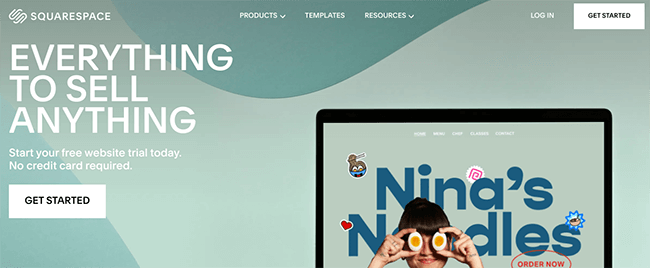
It makes the customer’s journey much more efficient. You can sell different types of digital content. You can also sell subscriptions. And it offers flexible payment options with built-in tax tools. You can promote products by offering discount codes or gift cards.
You have the option to use any of the connected commerce tools like Apple Pay, Xero, Afterpay, ShipStation, FedEx, and UPS. And thanks to its Mobile Store Management feature, you can run your business from anywhere.
But we haven’t even mentioned what makes Squarespace so popular — its templates.
There are so many templates to choose from. No matter what industry you’re in, you’re bound to find something that will fit your brand just right. And considering how modern, responsive, and professional their templates look, your business will look even more legitimate.
Pricing: Business ($18/month billed annually + 3% transaction fees), Basic ($26/month billed annually), Commerce ($40/month billed annually)
9. BigCommerce
BigCommerce is another platform that you can use to create a full online store. It offers an enterprise solution for larger businesses and an Essentials plan for startups & small businesses.
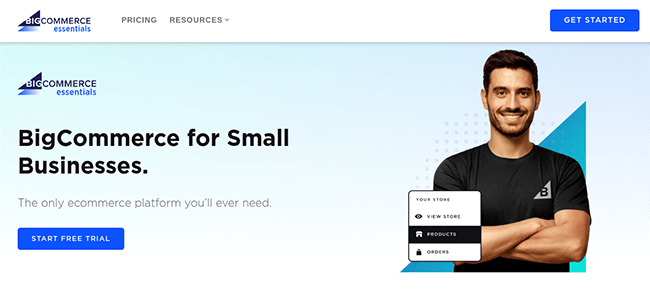
Compared to the others on this list, BigCommerce has more advanced features. For those selling physical products, you’ll be happy to hear that this platform provides you with an inventory system that tracks how many products you still have on hand. You can also target a specific customer group using unique messages and offers.
It also provides 65 payment gateway options that include PayPal, Stripe, and Authorize.net. There are also options for digital and mobile wallets.
BigCommerce doesn’t slouch when it comes to marketing either. The platform gives you SEO-friendly themes to work with and creates sitemaps automatically. You’ll have complete control over SEO elements like URLs, meta tags, and header tags.
It’s also great for selling products over social media. It works seamlessly with social sites like Facebook and Instagram. You can also use BigCommerce to advertise on Google Shopping. And if you want to, you can start a blog to improve your chances of ranking on search engines even further.
BigCommerce uses a drag-and-drop website builder, making it easy for anyone to generate an online store without the need for coding. And you can easily manage transactions as well thanks to measures like account creation for faster checkouts as well as dedicated SSL support that lets customers stay on your domain as their orders are processed.
This platform will even send emails reminding users of abandoned shopping carts. You can also incentivize users through coupons and discounts.
BigCommerce offers a 15-day free trial.
Pricing: Plans start from $39/month (save 25% with an annual subscription). All paid plans have no transaction fees.
Final thoughts
And that wraps up our roundup of the best alternatives to SendOwl.
While SendOwl offers a great solution to selling digital downloads, it’s always worth checking out your other options. And one of these platforms may be more suitable to your needs.
Ultimately, the best option will depend on exactly what you want to sell. But be sure to factor in any plans you may have for your store in the future. It may be best to choose a platform that has more than you need right now, so you don’t have to migrate later.
The good news is that most of these platforms can accommodate a variety of digital products. Ebooks, video, music, and more. Others can handle subscriptions, print-on-demand merchandise, and physical products.
To learn more, you may want to check out our articles on platforms to sell digital products, or our roundup of the best ecommerce platforms to create online stores.
Disclosure: Our content is reader-supported. If you click on certain links we may make a commission.
